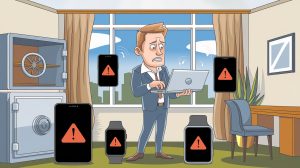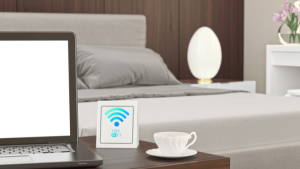It is indeed easier to imagine life in the modern world with the internet. So, it’s no wonder most hotels have Wi-Fi networks that catch visitors’ attention. But there’s always a catch: Is hotel wifi safe and is hotel wifi safe with VPN? Using their networks comes with convenience and challenges of its own.
In this guide, we will discuss guests’ typical challenges, figuring out answer to your question, is hotel wifi safe with a free VPN and how everyone can reduce the risks of connecting to the hotel wifi. So let’s get started and dive into the article:

Most common risks when you use Hotel Wi-Fi
By initiating a connection to a hotel network, you grant access to various cyber-attacks. The big question on most people’s minds are is it safe to connect to hotel wifi and how to survive these attacks and preserve your data?
The primary issue regarding the wifi network in almost any hotel is security. Even though it is always mentioned in the introduction section, it must be noticed while trying to connect. A hacker can collect sensitive information from unprotected wifi networks because they don’t require the multiple security features that most private networks do, enabling easy data breaches.
Security analysts are calling attention to the threats associated with public wifi. Alex Smith, a cyber security analyst at Secure Net wifi, explains about hotel wifi security:
“In fact, Wi-Fi connections in hotels remain one of the weakest links in a traveler’s cyber security management, allowing hackers to easily breach confidential details.”
Man-in-the-middle attacks
Another hazard of hotel wifi security that should greatly worry smart phone and tablet users is the danger of man-in-the-middle attacks. A man-in-the-middle (MITM) attack happens when hackers interpose their presence between the device and the wifi connection. An attacker can now spy on all active users, changing or stealing information without them knowing. This vulnerability can cause significant issues such as privacy invasion and loss of money and other forms of property.
Fake hotspots and rogue networks
Fake hotspots and rogue networks are serious concern in hotel wifi privacy. Fake wifi flyers replicating the original ones are often seen in hotels. Unfortunately, many naive people connect to fake wifi networks and hoard sensitive information for hackers. During significant events, there are many counterfeit hot spots as criminals take advantage of the large number of people.
In one case, a significant event occurred during which people connected to a rogue Access Point Accumulated debts and losses from identity theft. This incident serves as a reminder that it is relatively trivial for hackers to establish fake networks, which must be verified before they can be connected.
Malware and phishing threats
Using hotel wifi is risky because it exposes users to malware and phishing attacks. Cybercriminals can use such networks to embed malware or lead users to incorrect sites whose aim is to harvest login details or other sensitive information. Such threats are not only a risk to individual user data but can propagate malware in a multi-user environment.
Weak or outdated encryption protocols
Poor and outdated encryption protocols are standard features of many hotel wifi security and networks, meaning the chances of hackers accessing a network and seeking information are even more accessible. It is not enough if a network has a password; even if such a network has a password, it is still useless if the encryption standards are not up to the required standards.
Data interception by other users on the network
Once you connect to the hotel’s wireless connection, you become one of hundreds of users sharing one network. This environment magnifies exposure and risk to data interception. If the security measures are lax, other users within the network can spy on your activities or try to reach your device.
It is also widely held that unauthorized individuals may monitor such networks to learn about users and what they may be doing on the Internet. This monitoring will likely expose users to unauthorized data collection, privacy intrusion, and possible data breaches. Such tracking, if not analogous to banner ads and annoyances, can pose real risks and lead to data loss, and users must safeguard their data.
Knowing why hotel wifi networks are usually not secure is essential for protecting your data content. There are some reasons underlying the security weaknesses of these networks.
Low level of network encryption
Many hotels typically implement basic encryption protocols that must be more robust to protect data. Such encryption is easily circumvented by hackers, who then steal valuable data. More advanced encryption standards are what make hackers active targets of hotel Wi-Fi.
Overcrowded number of users and network overload
Many guests want to use a hotel’s amenities, and they all connect to the same thick wires. In addition, there is a jumbo load of users; hence, securing constant security measures is almost impossible. More users entail a higher chance of a cyber attack because there are holes in overworked systems that hackers are out to capitalize on.
Absence of unique user logins
Similar scenarios are not experienced in private networks because they need a specific authentication method per person, but the same does not apply to hotel wifi. Because there is no particular authentication, it is hard for the network’s perimeter to tell users apart. This leads to an increased risk of false entry and loss of data and information, which should be avoided.
Compartmentalizing hotel security is also causing problems, as shared networks spread across several rooms and public areas. These specific shared networks imply a weakness in one, which means all are exposed to risk
How to stay secure when using hotel wifi?
Although the dangers posed by hotel wifi are numerous, there are a few things you can do to secure yourself and your information. Doing this helps to strengthen your cyber security while on the move.

Use a VPN to encrypt your connection
When someone connects to a VPN, their internet traffic is routed through a secure server, encrypting all their data and making it harder for anyone to snoop on them. Due to this isolation on the trusted network, a hosted network to a VPN ensures that outside intruders will not compromise this device.
Therefore, a VPN is highly effective for hotel wifi. The answer everyone dreads whenever someone asks “Is hotel wifi safe with VPN?” is always a clear yes!
Limit the use of sensitive accounts (such as emails and banking)
Do not log into sensitive accounts such as online banking or emails when connected to hotel networks. These accounts contain susceptible personal details that are irresistible to hackers. Avoid conducting such activities until on more secure networks or enable VPN as a measure of protection.
Turn off automatic connections as well as file-sharing
Turn off automatic connections to stop your device from connecting to a network without your permission. Automatic connections make it easy for a device to join an unsecured network without the owner’s consent. Also, turn off file sharing to prevent it from reaching your device and its files and materials without your permission.
Constantly update device security software and OS
Updating device security and OS is essential because it helps cover some weaknesses already being exploited. Most of these updates include repairs for security gaps that viruses can abuse.
Disconnect from the network whenever it’s not in use
Please turn off the hotel’s internet connection while you’re on the internet and do not use it. Simply doing this helps decrease a person’s exposure to most threats and limits the chances of the user getting unauthorized access to their electronic devices.
Enhance safety against cyber threats while traveling
There is no need to compromise your cyber security posture while making trips and booking hotels. Steps can be taken to reduce the risk of being exposed to risks when using hotel internet.
Following the recommendations in this article—whether using a VPN, working without using sensitive accounts, or enabling 2FA—will improve your online security in a way that cannot be overemphasized. Be educated on the threats and take precautions to ensure safe and secure travel wherever the user goes.

Secure your connection with Planet VPN
With the increased virtualization that has been embraced for years, the question “Is wifi hotel wifi safe with VPN?” is no longer asked but answered in diverse ways and sometimes optimized in the best way possible. There is always a threat when it comes to hotel wifi; wifi is a means to ensure you remain safe and secure by employing strategies identified in this guide.
Understanding and implementing best practices is essential for business travelers, vacationers, and the average person who uses public networks several times. But remember, security does not happen in a vacuum, and one has to remain watchful and aware to make an impact on cyber security. Just give this VPN a try and download free VPN by Planet VPN today for your security!
By making an effort today, you will figure out the key strategic moves for secure and hassle-free
travel. Keep yourself knowledgeable, secure yourself, and travel the world with all the ease you wish to have.